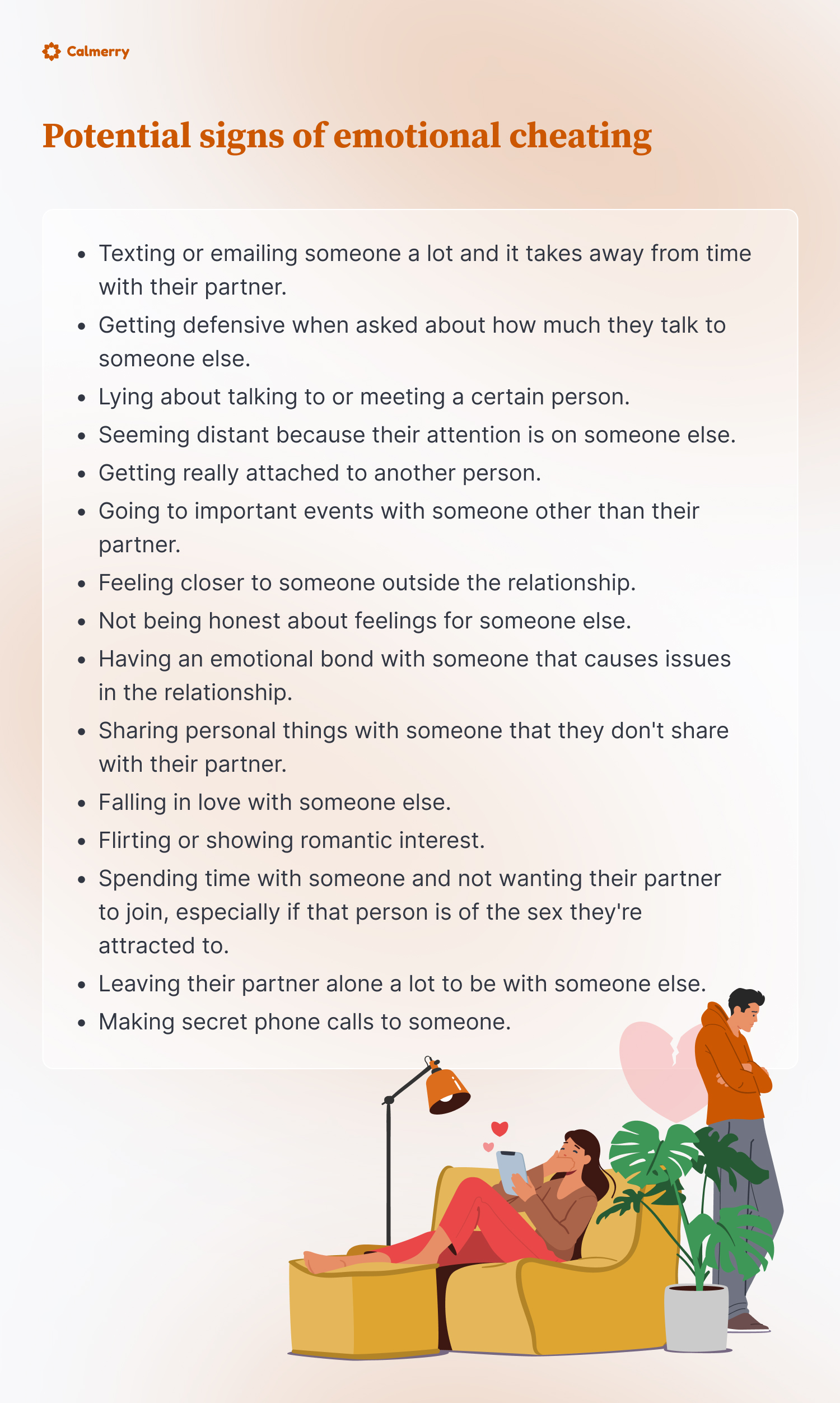Signs Of Emotional Cheating in a Relationship & Ways To Overcome It

In this article
When people think about infidelity, they often imagine one partner stepping outside the relationship and having a sexual relationship with someone else.
While this is one form of infidelity, a less well-known and perhaps even more damaging form is emotional cheating.
With this type of cheating, the infidelity moves beyond the physical realm to include a deeper, more personal connection. This can understandably cause damage to a relationship.
Reasons behind emotional cheating
It’s important to understand that if your other half is emotionally withdrawn, it’s not your fault.
People may cheat in response to relationship problems, but this doesn’t justify infidelity. There are healthier ways to manage conflict or differences of opinion without turning to mental affairs.
That being said, some common reasons for mental affairs include:
- Being dissatisfied in a relationship
- Significant conflict in a relationship
- Having an insecure attachment style
- Certain personality traits, such as being high on extraversion and low in conscientiousness
- Developing a connection with someone at work due to shared values and interests
- Poor judgment due to stress
- Desiring greater sentimental intimacy than the primary partnership is providing
- Being angry at each other
Emotional cheating vs physical betrayal
Most people agree that there is a difference between physical and emotional cheating. It’s important to be aware of the specific differences between emotional vs physical betrayal. It’s also helpful to understand that a platonic affair can exist without a physical affair. Similarly, physical infidelity can exist without an emotional affair.
When cheating is purely emotional, there is no sexual contact. Two people may develop a deep, soulful bond and spend time together without progressing to sexual intimacy.
An emotional affair can even occur entirely via text message or email, with two people establishing a deep emotional bond but never meeting up physically.
On the other hand, a physical affair can be entirely sexual. Two people may meet up for the sole purpose of having sex, without any emotional meaning tied to the relationship.
Additionally, an affair can be both emotional and sexual. A person may step outside of their relationship and establish a soul connection with someone else, eventually progressing to a sexual relationship.
This emotional affair may even look somewhat like a second relationship or a replacement for the primary bond the person had before the affair.
Is emotional cheating worse than physical?
There are different opinions about whether mental or physical infidelity is worse.
On the one hand, having an emotional affair means establishing a deep connection with another person, which is obviously distressing and hurtful for the non-offending partner.
At the same time, having a sexual relationship with another person outside of your relationship also constitutes a betrayal.
So, which is worse? It might depend upon your gender.
One study found that women find mental infidelity to be more distressing than men, whereas men rank sexual infidelity as more serious when compared to women.
However, both genders found sexual infidelity to be more upsetting than a platonic affair.
It seems that women are more inclined to become upset in response to emotional infidelity when compared to men, but both genders view sexual infidelity as more distressing overall. Of course, everyone is different, so some people may not conform to this standard.
– Dr. Jenni Jacobsen, PhD, Licensed Social Worker (LSW), mental health writer
Relationships can survive a platonic affair, but both partners have to be committed to repairing the relationship. This means that the person who engaged in mental affair will need to offer a legitimate apology and commit to changing their behavior.
At the same time, the person who was cheated on will need to move forward as well. It’s certainly normal to be upset and take some time to grieve.
However, if the relationship is to move forward, you cannot hold a grudge forever.
If you simply cannot move past the cheating, it’s probably best to call it quits.
Emotional affair recovery is possible. If you decide to stay in the relationship, this means both of you will need to make changes.
If you’ve been the victim of the affair, you will need to learn how to forgive emotional cheating in your other half.
Some helpful steps for recovering and learning to rebuild trust include:
- Talk with your loved one about how the platonic affair has affected you, and make a plan for moving forward.
- Allow yourself some time to grieve, but be willing to accept a legitimate apology from your partner.
- Be kind to yourself. Overthinking after being cheated on is common, so grant yourself some grace if you’re having intrusive thoughts. Express what you need from your other half to feel secure again. If they’re committed to making things work, they will be willing to offer emotional support.
- Focus on self-care rather than worrying about “what ifs” and what might happen if your partner cheats again.
- Avoid entirely blaming yourself, and remember that when there are problems in a relationship, there are two people involved.
- Work with your partner to resolve relationship problems, such as poor communication or lack of intimacy.
- Consider seeking professional help to navigate the emotional challenges and rebuild trust.
These steps can be challenging, and they may take time; although, you might benefit from the support of a counselor or therapist during this process.
Validation of emotional cheating as a problem
It isn’t quite as straightforward as sexual infidelity. Most of us can pretty easily think of examples of sexual infidelity.
Actions like kissing, caressing, or having a sexual relationship with someone who isn’t our partner are probably readily accepted as examples of having an affair.
So, what is considered emotional cheating?
There is a range of definitions, and what one person considers to be platonic affair might be different from what another person would say.
That being said, there are some actions that are generally accepted as emotional cheating.
One study that evaluated perceptions of platonic affairs found that the following behaviors are commonly regarded as it signs:
- Going to an important event with another person outside of the relationship
- Being dishonest with your partner about how you feel toward another person
- Being emotionally attached to another person, especially when it means being more attached to someone other than your other half.
- Having an emotional connection with someone else to the extent that it creates problems in your relationship
- Sharing personal information with another person, when such information is not shared with one’s partner
- Being in love with another person
- Semi-sexual behavior like any kind of flirting
Part of the above-mentioned study asked people to create definitions of such behavior. At the conclusion of the study, the top agreed-upon definition was:
“Emotional infidelity is being ‘in love’ or more dedicated emotionally to someone other than the partner, or family, someone with romantic potential.”Signs of Emotional Cheating
As the above definitions suggest, mental affair occurs when time spent with someone else, or emotional dedication to a person other than your partner, creates problems within the relationship.
If a partner is engaging in mental infidelity, you may notice some of these warning signs:
- Spending an excessive amount of time texting another person
- Becoming defensive when confronted about the amount of time they’re spending talking to someone else
- Lying about spending time with or talking to a specific person
- Being very protective of their phone, because they don’t want you to see who they’re texting or calling
- Appearing emotionally distant, which might be because they’re devoting their attention to someone else
- Seeming as if they are becoming quite attached to someone else
- Emotional withdrawal from the primary relationship

How can couples rebuild trust after an emotional affair?
Another top definition revealed in the study was:
“When a person in a relationship creates emotional distance by spending an excessive amount of time with, or thinks about, another person outside of the relationship, to the point that the other partner becomes ignored or rejected emotionally.”When you’re not sure whether your partner’s behavior constitutes emotional cheating, it is helpful to look at some examples.
The following behaviors are some good examples of emotional cheating:
- Your partner regularly goes to lunch with a colleague and develops a deep personal connection with that person.
- You catch your partner frequently texting another person, and they seem defensive about it and hide their phone.
- Your partner is spending time with another person of the opposite sex (or the same sex if they experience same-sex attraction), and they do not want you to be involved.
- You catch your partner sneaking away to make secret phone calls to another person.
- Your partner is texting or emailing another person to the point that it’s taking away from your quality time with your partner.
- Your partner is leaving you at home or neglecting you to spend time with another person.
- You find that your partner is texting or calling another person and sharing deep personal information, or talking about establishing a relationship with this person.
The bottom line is that emotional cheating can be somewhat subjective. The above examples give a clearer idea of what emotional cheating is, but it’s ultimately up to your personal comfort level.
If your partner’s emotional connection to someone else makes you uncomfortable or interferes with the relationship, it could constitute emotional cheating, even if it doesn’t fit with one of the examples above.
– Dr. Jenni Jacobsen, PhD, Licensed Social Worker (LSW), mental health writer
How common is emotional cheating?
Emotional cheating is surprisingly common in relationships. It happens when someone becomes emotionally close to another person outside their relationship, forming a deep bond that often involves sharing personal feelings, thoughts, and experiences.
This can create a sense of intimacy that rivals or even surpasses the connection they have with their partner.
Studies suggest that many people don’t even realize they’re emotionally cheating, as they might not see anything wrong with forming a close friendship.
However, if this friendship starts causing distance in their primary relationship or leads to feelings of guilt, it may be a sign of emotional cheating.
Overall, while it can be hard to measure exactly how common emotional cheating is, it’s clear that it happens frequently and can be just as damaging to relationships as physical cheating.
Emotional cheating vs. physical cheating
Most people agree that there is a difference between emotional and physical cheating. We’ve defined emotional cheating and given examples above, and you probably already have an understanding of physical cheating.
It’s important to be aware of the specific differences between emotional vs. physical cheating. It’s also helpful to understand that emotional cheating can exist without physical cheating. Similarly, physical cheating can exist without emotional cheating.
Emotional cheating
When cheating is purely emotional, there is no sexual contact. Two people may develop a deep emotional connection and spend time together without progressing to sexual intimacy.
An emotional affair can even occur entirely via text message or email, with two people establishing a deep connection but never meeting up physically.
Physical cheating
On the other hand, an affair can be entirely physical. Two people may meet up for the sole purpose of having sex, without any emotional meaning tied to the relationship.
Additionally, an affair can be both emotional and sexual. A person may step outside of their relationship and establish an emotional connection with another person, eventually progressing to a sexual relationship.
This affair may even look somewhat like a second relationship or a replacement for the primary relationship the person had before the affair.
Is emotional cheating worse than physical cheating?
There are different opinions about whether emotional or physical infidelity is worse.
On the one hand, having an emotional affair means establishing a deep connection with another person, which is obviously distressing and hurtful for the non-offending partner.
At the same time, having a sexual relationship with another person also constitutes a betrayal.
So, which is worse? It might depend upon your gender.
One study found that women find emotional infidelity to be more distressing than men, whereas men rank sexual infidelity as more serious when compared to women [2] Kruger, D. J., Fisher, M. L., Fitzgerald, C. J., Garcia, J. R., Geher, G., & Guitar, A. E. (2015). Sexual and Emotional Aspects are Distinct Components of Infidelity and Unique Predictors of Anticipated Distress. Evolutionary Psychological Science, 1(1), 44–51. https://doi.org/10.1007/s40806-015-0010-z .
However, both genders found sexual infidelity to be more upsetting than emotional infidelity.
Emotional cheating vs. friendship
Sometimes, people wonder about the difference between emotional cheating and friendship. The two can sometimes look similar, but an emotional affair moves beyond friendship with someone of the opposite sex.
Friendship is purely platonic, and there is no romantic intention. If your significant other has a platonic friendship with another person, they won’t feel the need to hide the relationship from you.
They will be open about their interactions with this friend, and they’ll likely invite you along when they hang out with the friend.
On the other hand, when someone is cheating emotionally, it moves beyond friendship. They will establish a deep emotional connection with this person, and they may even develop feelings of romantic love for the person.
When this happens, they’re likely to hide the seriousness of the relationship from you, because they know it would create problems for your relationship.
What are the causes of emotional cheating?
It’s important to understand that if your partner has an emotional affair, it’s not your fault.
People may have affairs in response to relationship problems, but this doesn’t justify infidelity. There are healthier ways to manage conflict or differences of opinion without turning to cheating.
That being said, some common reasons for emotional cheating include [3] Rokach, A., & Chan, S. H. (2023). Love and Infidelity: Causes and consequences. International Journal of Environmental Research and Public Health, 20(5), 3904. https://doi.org/10.3390/ijerph20053904 :
- Being dissatisfied in a relationship
- Significant conflict in a relationship
- Having an insecure attachment style
- Certain personality traits, such as being high on extraversion and low in conscientiousness
- Developing a connection with someone at work due to shared values and interests
- Poor judgment due to stress
- Desiring greater emotional intimacy than the primary relationship is providing
- Being angry at one’s partner
What to do when your partner emotionally cheats?
If you’ve been a victim of emotional infidelity, you have a right to be upset. The first step to take is to confront your partner about their behavior.
At a time when you are both calm and undistracted, sit down with your partner and tell them that you consider their behavior to be emotional cheating. Be prepared to provide specific examples of behavior that you find upsetting and explain how it affects you.
How the relationship proceeds from that point depends upon how your partner reacts. Perhaps they will admit to what they’ve done wrong, express remorse, and ask for a chance to repair the relationship. Alternatively, they might become defensive and angry, and deny any wrongdoing.
Once you express your feelings to your partner, you will need to decide whether you want to stay in the relationship. You may be able to forgive and move forward, but you also might decide that the damage is too deep to repair.
– Dr. Jenni Jacobsen, PhD, Licensed Social Worker (LSW), mental health writer
Can a relationship survive emotional cheating?
Relationships can survive emotional cheating, but both partners have to be committed to repairing the relationship. This means that the person who cheated will need to offer a legitimate apology and commit to changing their behavior.
At the same time, the person who was cheated on will need to move forward as well. It’s certainly normal to be upset and take some time to grieve.
However, if the relationship is to move forward, you cannot hold a grudge forever.
If you simply cannot move past the cheating, it’s probably best to call it quits.
How to heal from emotional cheating?
Emotional affair recovery is possible. If you decide to stay in the relationship, this means both partners will need to make changes.
If you’ve been the victim of the affair, you will need to learn how to forgive emotional cheating in your partner.
Some helpful steps for recovering include:
- Talk with your partner about how the cheating has affected you, and make a plan for moving forward.
- Allow yourself some time to grieve, but be willing to accept a legitimate apology from your partner.
- Be kind to yourself. Overthinking after being cheated on is common, so grant yourself some grace if you’re having intrusive thoughts. Express what you need from your partner to feel secure again. If they’re committed to making things work, they will be willing to offer reassurance.
- Focus on self-care rather than worrying about “what ifs” and what might happen if your partner cheats again.
- Avoid entirely blaming yourself, and remember that when there are problems in a relationship, there are two people involved.
- Work with your partner to resolve relationship problems, such as poor communication or lack of intimacy.
These steps can be challenging, and they may take time; although, you might benefit from the support of a counselor or therapist during this process.
Should I tell my partner I emotionally cheated?
Perhaps you find yourself realizing, “I emotionally cheated.” If this is the case, you might be looking for advice on whether you should tell your partner.
This is a personal decision, and it depends on your own values as well as the extent of the cheating.
If the emotional cheating truly was a one-time thing, and you feel that revealing it would do more harm than good, you might decide to keep it to yourself.
On the other hand, being honest with your partner maintains the integrity and trust in your relationship.
Honesty about cheating could help you solve problems in your relationship. For instance, you might talk with your partner about the factors that led to cheating and use it as an opportunity to learn from the experience and grow as a couple.
– Dr. Jenni Jacobsen, PhD, Licensed Social Worker (LSW), mental health writer
If you decide to remain in the relationship after emotionally cheating, what is most important is that you find ways to resolve any personal and relationship problems that led to cheating in the first place.
Infidelity, whether emotional or physical, can be devastating to your partner, and it isn’t a healthy way to maintain a relationship.
Start healing with therapy
If you’re struggling after an emotional affair, it’s important to understand that surviving infidelity is possible. Whether you were the cheater or the person who was cheated on, online therapy can be helpful.
At Calmerry, we offer online therapy for mental and emotional health problems, including infidelity. We do not offer couples counseling at this time, but we can offer individual therapy for those struggling with issues related to infidelity.
In individual sessions, you can learn tools for coping with infidelity, or if you were the one who cheated, you can learn to overcome personal barriers that led to your choice to step outside the relationship.
Guitar, A. E., Geher, G., Kruger, D. J., Garcia, J. R., Fisher, M. L., & Fitzgerald, C. J. (2016). Defining and distinguishing sexual and emotional infidelity. Current Psychology, 36(3), 434–446. https://doi.org/10.1007/s12144-016-9432-4
Kruger, D. J., Fisher, M. L., Fitzgerald, C. J., Garcia, J. R., Geher, G., & Guitar, A. E. (2015). Sexual and Emotional Aspects are Distinct Components of Infidelity and Unique Predictors of Anticipated Distress. Evolutionary Psychological Science, 1(1), 44–51. https://doi.org/10.1007/s40806-015-0010-z
Rokach, A., & Chan, S. H. (2023). Love and Infidelity: Causes and consequences. International Journal of Environmental Research and Public Health, 20(5), 3904. https://doi.org/10.3390/ijerph20053904
online therapy
live video session



